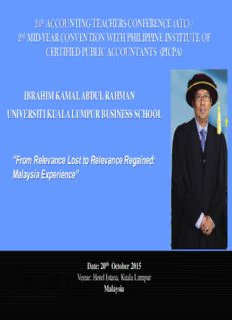
From Relevance Lost to Relevance Regained: Malaysia Experience'' IBRAHIM KAMAL ABDUL PDF
Preview From Relevance Lost to Relevance Regained: Malaysia Experience'' IBRAHIM KAMAL ABDUL
24th ACCOUNTING TEACHERS CONFERENCE (ATC) / 2nd MID-YEAR CONVENTION WITH PHILIPPINE INSTITUTE OF CERTIFIED PUBLIC ACCOUNTANTS (PICPA) IBRAHIM KAMAL ABDUL RAHMAN UNIVERSITI KUALA LUMPUR BUSINESS SCHOOL “From Relevance Lost to Relevance Regained: Malaysia Experience’’ Date: 20th October 2015 Venue: Hotel Istana, Kuala Lumpur Malaysia PRESENTATION OUTLINE PART 1 – INTRODUCTION PART 2 – NATIONAL AWARD FOR MANAGEMENT ACCOUNTING PART 3 – AWARD WINNERS PART 4 – CONTRIBUTIONS, PUBLICITY, AWARD WINNERS & RECOGNITION PART 1 INTRODUCTION Management Accounting as Defined by IFAC: “the process of identification, measurement, accumulation, analysis, preparation, interpretation and communication of information (both financial and operating) used by management to plan, evaluate, and control within an organization and to assure use of accountability for its resources”. Management Accounting as a Strategic Tool Controlling the current activities of an organization Planning its future strategies, tactics and operations Optimizing the use of its resources Measuring and evaluating performance Reducing subjectivity in the decision making process; and Improving internal and external communication Managerial Accounting Basics Comparing Managerial and Financial Accounting Management Accounting Framework Stakeholder Adding Value CONTINUOUS LEADERSHIP STRATEGIC OPERATIONAL LEADERSHIP LEARNING & MANAGEMENT ALIGNMENT IMPROVEMENT Enable individual Creating and Creating and Formulating and Planning for the and infusing shared infusing shared communicating future organizational beliefs beliefs strategy learning Creating and Creating and Acquiring process Identifying, Communicating infusing shared infusing shared improvement skills managing risks vertically boundaries boundaries Facilitating Facilitating Assessing Coordinating Acquiring process effective decision- effective decision- performance horizontally improvement skills making making Enabling Enabling Evaluating & Streamlining organizational organizational Analysing decision rewarding compliance duties change & change & alternatives employees innovation innovation Partnering to improve operations Source: Brewer, Peter, C. (2008) Evolution of Management Accounting Strategic Focus & Risk Management Phases of Evolution Fundamentally, the evolution can be distinguished into four phases: Stage 1 (prior to 1950) - Focus was on cost determination related to stock valuation and allocation of overheads. - Techniques included Last in First Out (LIFO) and First in First Out (FIFO). Stage 2 (1965-1985) - Focus on generating information for management planning and control - Techniques included marginal costing and responsibility accounting - Aimed at helping managers to choose course of action and create strategic business units Stage 3 (1985-1995) - Focus was on process analysis together with cost management technologies - Techniques included Just in Time (JIT) and Activity Based Costing (ABC) - Aimed at reducing waste and expenses incurred, thus increasing expected profits Stage 4 (1995 onwards) -Identifying factors that could potentially increase shareholder’s value and eliminating non-value added activities - Techniques included Total Quality Management (TQM), Activity Based Management (ABM), Benchmarking and Re-engineering - Aimed at value creation through resources Management Accounting Best Practice Focuses on Four Elements: 1 FUNCTION RELATED CONCEPTS 2 OUTCOME UTILITY RELATED CONCEPTS 3 PROCESS & TECHNOLOGY RELATED CONCEPTS 4 FUNCTION CAPABILITY RELATED CONCEPTS
Description: